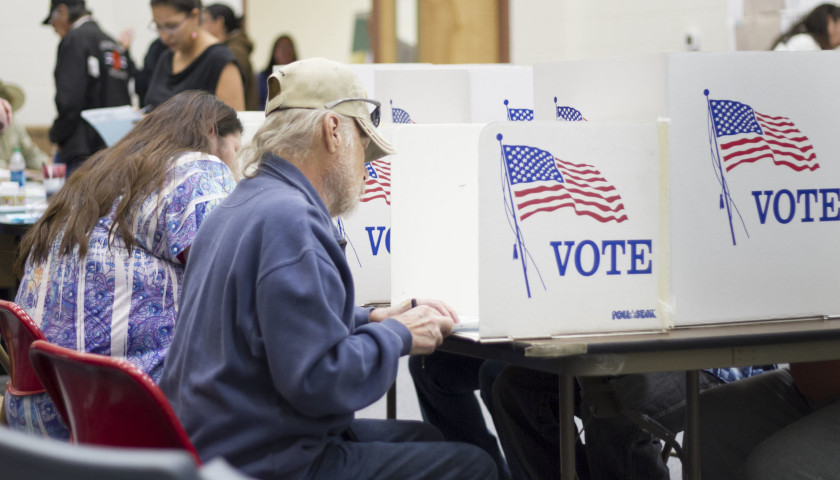by Nyamekye Daniel
The Georgia Senate approved four measures Tuesday that make changes to the election process as a response to November’s presidential election.
Georgia gained national attention after a close presidential election prompted three recounts and lawsuits and threats from former President Donald Trump’s campaign and supporters. Several questions and allegations arose from Georgia’s absentee-ballot process.
Among the bills passed Tuesday, the Senate voted, 37-18, to reform the absentee-ballot-signature-matching-process that critics said is ripe for fraud.
Gov. Brian Kemp, Georgia Secretary of State Brad Raffensperger and some Republicans called for a revamp of the absentee-ballot voting process after the election. Raffensperger asked lawmakers to consider eliminating the signature-matching process and Georgia’s law that allows voters to request ballots by mail up to 180 days before an election.
The state reported a record number of absentee ballot votes last year because of the COVID-19 pandemic. According to the secretary of state’s office, no-excuse absentee ballot voting was used by 5% to 7% of Georgia voters – no more than 300,000 ballots – before the pandemic. Records show 284,393 Georgians voted with absentee ballots in the 2018 general election. That number skyrocketed to 1.3 million in the 2020 general election.
Senate Bill 67 requires absentee ballot voters to put their driver’s license or state-issued identification number on the ballot or include a photocopy of an accepted form of identification with their ballot request form instead of a signature.
Sen. Larry Walker, R-Perry, who introduced the bill, said the change would make the absentee ballot counting process more efficient and secure.
“You sign your name on that little digital screen, and your signature oftentimes really doesn’t look like your actual signature that you do on a daily basis,” Walker said. “You could run into the situation where a family member mailed in the ballot request, which is totally legal, and so the signature would be a moot point.”
The Senate voted to engross the bills ahead of debate Tuesday, which blocked changes to the measures.
Sen. Jen Jordan, D-Atlanta, said she had an issue with voters mailing their personal identification information to the elections office. She said it makes voters’ information more susceptible to fraud and violates privacy.
“There’s nothing in this bill that actually addresses the protections that would need to be in place with respect to voter and consumer identifying information,” Jordan said.
Sen. David Lucas, D-Macon, referred to SB 67 as “malarkey” and a result of Trump’s inability to accept his election loss. Lucas said he plans to “fight” the bill and “taxpayers will pay” for the legal action he intends to take.
Lt. Gov. Geoff Duncan pushed the four bills, which he dubbed a “common-sense election reform” package, in the Senate.
“I am focused on maintaining confidence in our electoral process and making it easy to vote and difficult to cheat,” Duncan said. “I am proud of this bipartisan package and the hard work of the individual bill sponsors. I look forward to the entire package reaching the governor’s desk.”
The legislative package included two other bills that would reform the absentee-ballot counting process. Senate Bill 40 would allow election workers to open and tabulate absentee ballots before Election Day. Under the bill, sponsored by Jordan, election officials must remain mum about the results until the polls close. SB 40 cleared the Senate unanimously, 53-0.
Senate Bill 188 requires counties to report the number of absentee ballots issued and returned and the number of in-person votes cast when the polls close. The Senate passed SB 188 with a 34-18 vote.
The Senate also approved Senate Bill 184, which decreases the time after an election that counties can reconcile or verify vote tallies from 60 days to 30 days. The measure cleared the Senate with a 37-15 vote.
“When these measures become law, voters will have confidence and confirmation that their vote was indeed counted and counted quickly with county election boards required to publicly post the total number of votes received before they begin tabulating,” said Sen. Bill Cowsert, R-Athens, who sponsored SB 188 and SB 184.
The bills now go to the House for consideration.
– – –
Nyamekye Daniel has been a journalist for four years. She was the managing editor for the South Florida Media Network and a staff writer for The Miami Times. Daniel’s work has also appeared in the Sun-Sentinel, Miami Herald and The New York Times. Daniel is a staff reporter for The Center Square.
Photo “People Voting” by Wyofile. CC BY 2.0.







